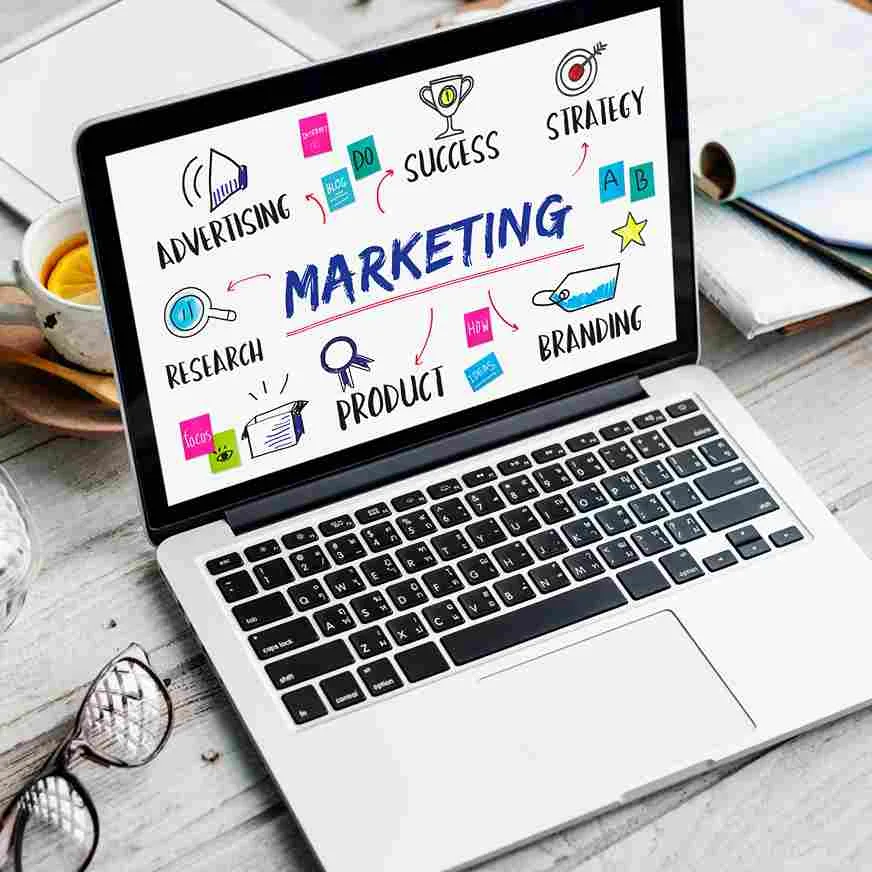
Introduction
AI in Social Media Marketing: Transforming the Digital Frontier Social platforms have totally changed how people joining, communicate, and consume content. With billions of users on social media platforms like Facebook, whatsapp, LinkedIn, instagram, and X ( Twitter), businesses now have an unique opportunity to engage with their target viewers. Social media marketing uses these platforms to new products, build brand consciousness, and encourage engagement. However, because of increasing oppostion and shift user conduct, traditional social media marketing strategies are no longer enough. .. This blog examines the definition of social media marketing, the function of artificial intelligence in this field, and the prospects for this fascinating nexus of digital marketing and technology
Table of Contents
Mastering Social Media Marketing (SMM) in 2025: Trends, Strategies & Success Formula

What is Social Media Marketing?
Social Media Marketing is the use of online platforms to promote a brand, product, or service. It involves content creation, community engagement, advertising, and performance analysis to achieve marketing and business goals.
Content creation includes audience-specific videos, images, and captions.
Messages, comments, and two-way communication are all examples of audience engagement.
Using paid campaign to reach broader or more specific audiences is known as social advertising.
Analytics & Reporting: Analysing performance wit
The practice of promoting a product, service, or brand through social media sites like Facebook, Twitter, instagram, LinkedIn, and others is known as social media marketing, or social media marketing. It entails producing and disseminating content to meet branding and marketing objectives like:
Raising awareness of the brand
Increasing traffic to websites
Creating Leads
Increasing sales
Increasing client loyalty
Getting involved with communities
Creating posts, responding to comments, and keeping an eye on performance indicators were all done by hand in the past. However, AI is now enhancing the effectiveness, speed, and intelligence
Importance of SMM in Modern Marketing

Real-Time Feedback: Participate and make quick strategy adjustments.
Reach particular interests and demographics with targeted advertising.
Create communities around brands to foster brand loyalty.
Increased Reach: Interact with audiences globally.
Cost-effective: Especially when compared to traditional media.
Benefits of Using AI in Social Media Marketing
1. Increased Customisation
AI increases user engagement and loyalty by using machine learning to generate personalised content for users based on their online activity.AI in Social Media Marketing: Transforming the Digital Frontier
2. Financial Savings
Reduced waste and improved return on investment are achieved by automating repetitive tasks and optimising ad spend.
3.Enhanced Efficiency
By automating time-consuming processes like analytics, posting schedules, and responses, artificial intelligence (AI) frees up human marketers to think strategically.
4.. Improved Decision-Making
With AI-powered analytics, marketers get real-time insights into campaign performance, audience behavior, and content effectiveness.
5. Constant Accessibility
Businesses can avoid missing customer enquiries or engagement opportunities by utilising AI tools and bots that operate continuously.
Examples of AI Tools in Social Media Marketing
| Tool Name | Function | Use Case |
| ChatGPT | Text generation | Caption writing, replies |
| Lately.ai | Content repurposing | Turn blogs into tweets |
| Canva AI | Smart design assistant | Branded graphics |
| Sprout Social | Social listening and analytics | Sentiment tracking |
| Brandwatch | Trend forecasting | Campaign planning |
| ManyChat | Automated Messenger chatbot | Customer support |
| Jasper AI | Marketing copywriting | Facebook/Google Ads |
Future of Social Media Marketing with AI
The integration of AI in SMM is only going to grow. Here’s what we can expect in the near future:
1. Visual and Audio Search
AI will work with visual recognition software and voice assistants to make brands searchable in non-text formats.
2. Influencers Created by AI
Lil Miquela and other virtual influencers have already arrived. Anticipate an increase in brand ambassadors created by AI to interact with younger audiences.
3. Identification of Trends in Real Time
AI will be able to identify viral trends as soon as they appear, allowing brands to take immediate action and remain ahead of the curve.
4. AI-powered hyper-personalized marketing will assist in delivering tailored messages in real time, instantly adjusting to a user’s actions.
5. By predicting the type of content that will be successful before it is even produced, predictive content planning tools can save money and increase return on investment.
6.The emergence of AI influencers (AI-generated characters and virtual avatars)
7.Predictive analytics for the virality of content
8.Extremely customised user experience
Tips for Marketers Adopting AI in Social Media
Emphasis on Ethics: Respect user privacy and be open and honest with users when bots are used.
Measure and Optimise: To improve AI tactics, continuously monitor performance.
Start Small: Before expanding, start with chatbots or AI tools for content
Recommendations.
Retain a genuine brand voice by remaining human. AI own to be used to help, not to return.
build sure your team is trained to use and adjust to AI tools.
Emphasis on Ethics: Respect user privacy and be open and honest with users when bots are used.
Examples of Brands Using AI in Social Media Successfully
Netflix: Using AI to personalise social campaigns and recommend content
Nike: trend monitoring and AI-generated advertising messaging
Sephora: Using social media chatbots to suggest products
7. Challenges and Limitations
- Loss of human touch in content
- Risk of over-automation
- Data privacy concerns
- Algorithm dependency
- Cost of implementation for small businesses
Benefits of AI-Powered Personalization
| Benefit | How it Helps |
| Higher Engagement | Tailored content increases likes, shares, and comments. |
| Boosted Conversions | Relevant content drives users toward action (purchase, sign-up). |
| Customer Retention | Personalized experiences increase loyalty and repeat business. |
| Better ROI | Focused campaigns waste less budget on irrelevant audiences. |
Real-World Examples
📌 Netflix
Uses AI to personalize thumbnails and trailers shown to users on social media based on past watch behavior.
📌 Coca-Cola
Employs AI to analyze social media conversations for product feedback and marketing trends.
Amazon: Customised product suggestions raise the typical order value.
Spotify: Creates AI-curated playlists based on user listening patterns, which brands can use to curate the own content.
Sephora: Uses AI chatbots to suggest beauty products on social media based on skin tone and previous purchase
Importance of Social Media Marketing
Globally, there are more than 5 billion active online platform users.
gives direct access to clients’ information and preferences.
provides advertising that is extremely targeted.
increases community and brand recognition.
increases conversions and website traffic.
🛍️ Social Commerce and Shoppable Posts: Redefining the Buying Journey
In 2025, the line between scrolling and shopping is thinner than ever. Thanks to social commerce, platforms like Instagram, TikTok, Pinterest, and Facebook are transforming into end-to-end shopping destinations, letting users discover, evaluate, and purchase products without leaving the app.
How AI is Used in Social Media Marketing
1. Content Creation Driven by AI
AI programs such as Writesonic, Copy.ai, and ChatGPT can produce:
Captions
Bits of information from blogs
Suggestions for hashtags
Scripts for videos
Machine learning is used by image and video editing programs such as Lumen5, RunwayML, and Canva AI to automatically create creative assets or even recommend designs.
2. Performance forecasting and predictive analytics AI tools examine past data to forecast:
The ideal moment to publish
Probability of engagement rates
Probabilities of conversion
This enables marketers to make decisions supported by data rather than their gut feelings.
3. Customisation and Audience Targeting
AI is able to: Divide audiences into groups based on interests, demographics, and behaviour.
Make content specifically for each user group.
Ad content can be changed dynamically in real time.
AI is already being used by platforms such as Google Performance Max and Meta Ads Manager to optimise budget distribution and ad targeting
4. AI Assistants and Chatbots
AI-powered chatbots provide:
24/7 customer service
Quick responses to frequently asked questions
Lead nurturing and qualification
Help with e-commerce (product suggestions, order monitoring)
5. Social Listening and Sentiment Analysis
AI can scan thousands of conversations to:
- Track brand mentions
- Identify trends
- Detect sentiment (positive, negative, neutral)
This allows brands to respond to public opinion in real-time and manage their reputation more effectively.
Challenges & Ethical Considerations
1. Algorithm Bias
AI is only as good as the data it’s trained on. If not properly monitored, it can perpetuate biases and stereotypes.
2. Over-Automation
Relying too much on automation can lead to generic content and loss of authentic brand voice.
3. Privacy Concerns
AI requires access to large amounts of user data, raising concerns about transparency and compliance with data regulations (e.g., GDPR, CCPA)
4. Job Displacement
As AI handles more marketing tasks, there’s a growing debate about its impact on human roles in digital marketing.
Conclusion: The Evolution of Social Media Marketing in 2025
Social Media Marketing in 2025 is more strategic, personalized, and community-driven than ever before. What once was a space for brand promotion is now a dynamic ecosystem where AI, content creators, social commerce, and user engagement intersect to create meaningful brand experiences.
Success in this landscape requires more than just regular posting — it demands a deep understanding of your audience, platform-specific strategies, smart use of AI tools, and a commitment to authentic engagement.
Whether you’re building brand awareness, driving sales, or fostering loyalty, the brands that win are those that listen more, engage better, and evolve faster.
The future of marketing is not just digital — it’s social, intelligent, and human-centered.
Would you like to follow this up with a downloadable checklist, visual infographic, or CTA for your readers?